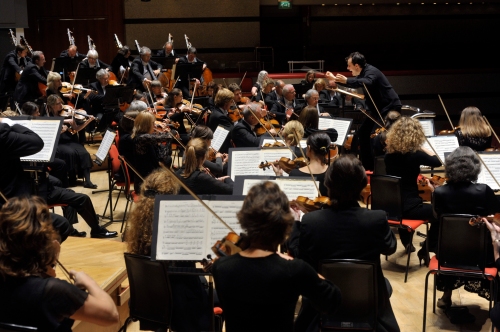It is telling – though not particularly subtle – that the name Wagner originally gave to Tannhäuser was ‘Der Venusberg’ (the Mount of Venus). The opera, like its creator, is incandescent with sexual excess. Luckily the composition is of more nuance and tact than its would-be title, and masterfully the Overture (as performed by the CBSO) explores the polarity of sensual and spiritual love, it once having been dubbed “one of the most extreme depictions of sex attempted in music” (though paradoxically enough it was a favourite of Queen Victoria’s).
The piece begins solemnly with the mellow warming notes of clarinets, horns and bassoons. Yet, there is almost an imperceptible melancholy and shortly, before the theme of spiritual love can develop, this melancholy is transformed by the entrance of the upper and lower strings into a dizzying, chromatic yearning – an allusion to ‘the temptations of the flesh’. Here we have Wagner at his most exhilarating; the giddiness of it all compels a sharp intake of breath (“Wagner’s art has the pressure of a hundred atmospheres”) whilst Nelsons draws out the visceral sense of yearning longer than any other performance of the overture I have heard.
This exhilaration founders, however, and is subdued by the solemn chant of the trombone. But it is not long before the tempo takes on a joyful allegro, with leaping flutes and violas depicting the ‘earthly delights’ of the ‘Venusberg’. The music crescendos into a vivacious, ebullient melody, driven by the full orchestra over pulsating strings; this is “the true, the terrible, the universal Venus” that Baudelaire writes of, the Venus which smothers our “sense of the divine” with “the lusts of the flesh”. Again, though, the music tumbles, this time into a vigorous swirl (depicting sexual abandon) before the wind instruments (spiritual love and redemption) are lifted by the whole orchestra into a triumphant apotheosis that echoes the last lines of Goethe’s Faust: “Das Ewig-Weibliche / Zieht uns hinan.” (“The eternal feminine lures us to perfection”).
The Tannhäuser overture, together with the Lohengrin prelude and the resolution of Tristan and Isolde, very much beg the question first put by Nietzsche in 1888: is Wagner a musician at all? Is he not a magician, a hypnotist, or rather, a sickness? Eventually he concludes that Wagner is a tyrant whose pathos topples every resistance, opining;
Who equals the persuasive power of these gestures? Who else envisages gestures with such assurance, so clearly from the start? The way Wagner’s pathos holds its breath, refuses to let go an extreme feeling, achieves a terrifying duration of states when even a moment threatens to strangle us.
Nietzsche’s equivocation belies his tone. This is praise for Wagner, as well it should be. Though what’s more, this is perhaps the diagnosis par excellence of the sorcery behind Tannhäuser and its breathless embrace.
By Alexander Blanchard
@blancharder


You must be logged in to post a comment.